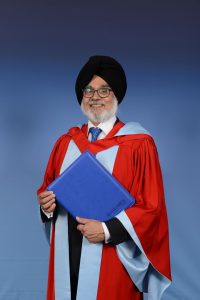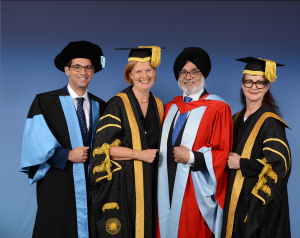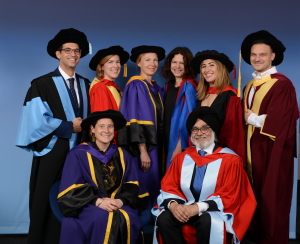 We are thrilled to announce that Goldsmiths has awarded The Right Honourable Sir Rabinder Singh a Doctor of Laws, honoris causa, of the University of London.
We are thrilled to announce that Goldsmiths has awarded The Right Honourable Sir Rabinder Singh a Doctor of Laws, honoris causa, of the University of London.
Lord Justice Singh accepted his award in our graduation ceremony at the Queen Elizabeth II Centre in Westminster. In his acceptance speech, he noted how “grateful” he was to receive the honorary degree “as we celebrate[d] [the students’] success and, in particular, the achievements of the first cohort of students at Goldsmiths who have completed a law degree”.
Lord Justice Singh started his speech by noting: “people sometimes ask me if I come from a family of lawyers. Some even ask me if my father was a judge. I suppose they assume that these things run in the family. The answer is No. I was the first lawyer in my family and the first judge. My ancestors lived and worked in what was then north-western India, in the Lahore region, which became part of Pakistan at the time of independence and partition in 1947. My parents moved to Delhi and, later, in the 1960s came to this country. I grew up in Bristol.”
He continued: “Like many immigrants my parents had to put up with verbal and even physical abuse. Like many immigrants, they regarded education as the key to their children’s future success. And like many immigrants they made sacrifices in order to support me with that hope in their hearts. I remember my father would say to me that, whatever became of me, I should never forget others who may not have been so fortunate and, in particular, that I should help them and not kick away the ladder after me.”

from left to right: Head of department of Goldsmiths Law, Prof Dimitrios Giannoulopoulos. Dinah Caine CBE, Chair of Council. Lord Justice Singh. Prof Frances Corner OBE, Warden of Goldsmiths.
Lord Justice of the Court of Appeal and President of the Investigatory Powers Tribunal, and the author of The Future of Human Rights in the United Kingdom (1997) and The Unity of Law (2022), Sir Rabinder is an authority on the recent development of the common law with particular reference to the field of human rights and the law of privacy. Called to the Bar in 1989, he became a QC in 2002. Appointed a High Court Judge (Queen’s Bench Division) in 2011, he became a Lord Justice of Appeal and a member of the Privy Council in 2017, and President of the Investigatory Powers Tribunal the following year. He has been an Honorary Professor of Law at Nottingham University since 2007, visiting Professor of Law at the London School of Economics from 2003 to 2009, and a Visiting Fellow, Lady Margaret Hall, Oxford, from 2016 to 2019.
Lord Justice Singh read law at Trinity College, Cambridge, before being awarded a Harkness Fellowship to study and travel in the United States, where he took a Master of Laws degree from the University of California, Berkeley.

Lord Justice Singh with Goldsmiths Law faculty: from top left to bottom right: Prof Dimitrios Giannoulopoulos. Dr Sheri Labenski. Dr Dagmar Myslinska. Dr Sally Adams. Dr Aysem Diker Vanberg. Dr Plamen Dinev. Dr Miranda Bevan, and Lord Justice Singh.
In 2000, he became one of the founding members of Matrix Chambers. Two years later, at the age of 38, Lord Justice Singh became one of the youngest people to be awarded silk.
He was Chair of the Bar Council Equality and Diversity Committee (Race and Religion) from 2004 to 2006, and Chair of the Administrative Law Bar Association from 2006 to 2008. In 2009 he was elected a Bencher of Lincoln’s Inn.
Born in Delhi, Lord Justice Singh grew up in Bristol, attending Bristol Grammar School, then a direct grant grammar school, after being awarded a local authority scholarship. He decided that he wanted to be a barrister while still at school, partly influenced by the film of Harper Lee’s book, To Kill a Mockingbird, starring Gregory Peck as Atticus Finch, a lawyer in the American South, who defends a black man accused of raping a white woman. ‘Atticus Finch talks about the law as the great equaliser’, he explains. ‘It’s clear he is a lawyer who regards himself as having a vocation. He will do his duty, even if he knows he’s going to lose the case, because it’s the right and just thing to do’.
Lord Justice Singh says he wonders whether he has subconsciously modelled himself on Peck’s portrayal of Finch. He was struck by one particular scene in which the father of the alleged victim spits in Finch’s face. For an instant, Finch thinks about retaliating, before maintaining both his silence and his dignity by doing nothing other than to take out his handkerchief and wipe his face.
You can read Lord Justice Singh’s full acceptance speech here: Lord Justice Singh acceptance speech 26 July 2022
The post draws on Professor Alan Downing’s oration speech at the graduation ceremony, which can be read in its entirety here: Prof Alan Downing speech